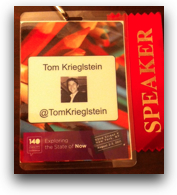
A couple of weeks ago, I attended the inaugural #140edu conference in NYC, which brought together several hundred educators for two days to talk about the future of education. Modeled after TED, each person was given roughly 10 minutes to talk about his/her topic. My topic was on leveraging social media to increase student engagement outside the classroom. You can watch my keynote here**.
After the first day of the conference, it was clear that the focus of my talk was different from almost everyone else. While everyone was involved in education somehow and had a desire to improve it, almost all the topics involved how to make “in-classroom” learning better, while my focus was on “out-of-classroom” learning. In higher ed, this is often an area managed by a Student Affairs department. Some statistics on the topic found on websites similar to Upskilled can be illuminating to the areas that require improvement.
I’ve attended dozens of education reform/revolution type conferences over the years, and I always end up feeling like the lone wolf talking about the “out-of-classroom” learning space. The informal learning moments that happen in-between classes.
Higher education analyst, Thomas G. Mortenson, revealed that a typical student will spend 15% of their day in class or working on classroom work and 35% of their day sleeping. That leaves 50% of the day for working or hanging around the campus community.
According to a UCLA national study of college seniors, 4 out of 5 seniors say their most significant learning moments happened outside the classroom.
Academic researchers Astin, Tinto, and several others, conclude that the more socially involved a student is within the campus community, the higher his/her retention and graduation rates are.
With such strong data to support the work I’m doing, why do I always feel like an outsider at the education reform conferences, where the conversation is dominated by in-classroom learning?